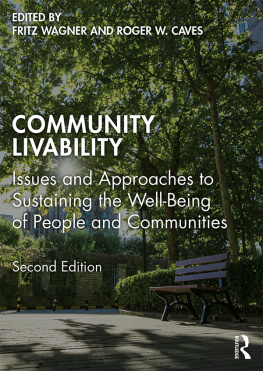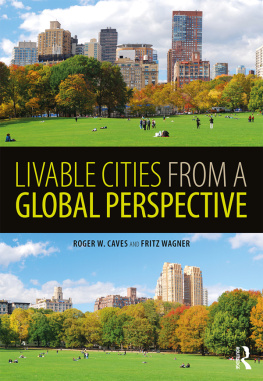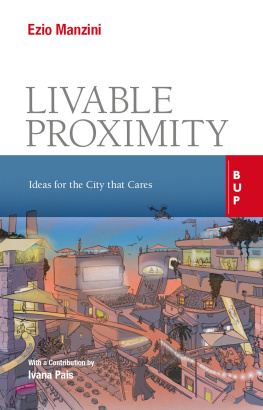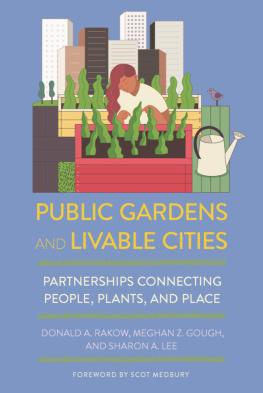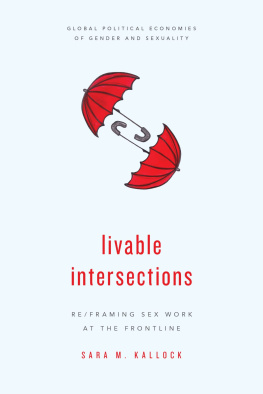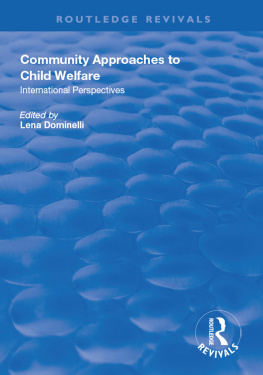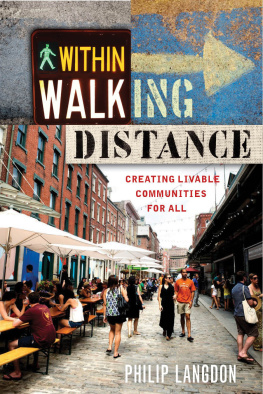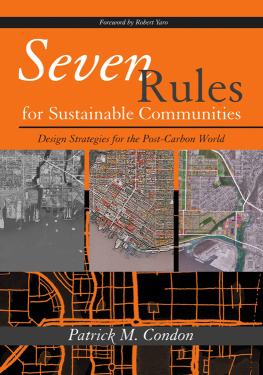Table of Contents
Guide
Print Page Numbers
community LIVABILITY
What is a livable community? How do you design and develop one? What does government at all levels need to do to support and nurture the cause of livable communities?
Using a blend of theory and practice, the second edition of Community Livability addresses evidence from international, state and local perspectives to explore what is meant by the term livable communities. The second edition contains new chapters from leading academics and practitioners that examine the various factors that constitute a livable community (e.g., the influence and importance of transportation options/alternatives to the elderly, the importance of walkability as a factor in developing a livable and healthy community, the importance of good open space providing for human activity and health, restorative benefits, etc., the importance of coordinated land use and transportation planning), and the relationship between livability and quality of life. A number of chapters focus on livable communities with case studies from an international perspective in the USA, Canada, Australia, Peru, Sweden, South Korea, Japan, and Austria.
Fritz Wagner has a doctorate in urban and regional planning from the University of Washington. On completion of his degree he moved to New Orleans, where he joined the University of New Orleans. During his 28-year tenure at the University of New Orleans, he served for 20 years as Dean/Director of the College of Urban and Public Affairs. In 2002, he joined the Department of Urban Design and Planning at the University of Washington.
Roger W. Caves is Professor Emeritus of City Planning, School of Public Affairs, San Diego State University. He received his doctorate in urban affairs and public policy from the University of Delaware in 1982. He has authored and edited many planning volumes, including Exploring Urban America: An Introductory Reader (1995) and Livable Cities from a Global Perspective (2018) with Fritz Wagner. His research areas include urban planning, direct democracy, smart cities, housing and information technology, and community development.
community LIVABILITY
ISSUES AND APPROACHES TO SUSTAINING THE WELL-BEING OF PEOPLE AND COMMUNITIES
Second Edition
Edited by
Fritz Wagner and Roger W. Caves

Second edition published 2020
by Routledge
2 Park Square, Milton Park, Abingdon, Oxon OX14 4RN
and by Routledge
52 Vanderbilt Avenue, New York, NY 10017
Routledge is an imprint of the Taylor & Francis Group, an informa business
2020 selection and editorial matter, Fritz Wagner and Roger W. Caves; individual chapters, the contributors
The right of the Fritz Wagner and Roger W. Caves to be identified as the authors of the editorial matter, and of the authors for their individual chapters, has been asserted in accordance with sections 77 and 78 of the Copyright, Designs and Patents Act 1988.
All rights reserved. No part of this book may be reprinted or reproduced or utilized in any form or by any electronic, mechanical, or other means, now known or hereafter invented, including photocopying and recording, or in any information storage or retrieval system, without permission in writing from the publishers.
Trademark notice: Product or corporate names may be trademarks or registered trademarks, and are used only for identification and explanation without intent to infringe.
First edition published by Routledge 2012
British Library Cataloguing-in-Publication Data
A catalogue record for this book is available from the British Library
Library of Congress Cataloging-in-Publication Data
Names: Wagner, Fritz W., editor. | Caves, Roger W., editor.
Title: Community livability : issues and approaches to sustaining the well-being of people and communities / edited by Fritz Wagner and Roger W. Caves.
Description: Second Edition. | New York : Routledge, 2020. | First edition published by Routledge 2012T.p. verso. | Includes bibliographical references and index.
Identifiers: LCCN 2019016948 (print) | LCCN 2019017695 (ebook) | ISBN 9781315111636 (ebook) | ISBN 9781138084858 | ISBN 9781138084858(hardback) | ISBN 9781138084865(paperback) | ISBN 9781315111636(ebook)
Subjects: LCSH: Sustainable livingCase studies. | Community lifeCase studies.
Classification: LCC GE196 (ebook) | LCC GE196 .C65 2020 (print) | DDC 307dc23
LC record available at https://lccn.loc.gov/2019016948
ISBN: 978-1-138-08485-8 (hbk)
ISBN: 978-1-138-08486-5 (pbk)
ISBN: 978-1-315-11163-6 (ebk)
Typeset in Garamond
by Wearset Ltd, Boldon, Tyne and Wear
Without the support of community members of Chelsea, Michigan, my hometown, this book would not have been possible. Special thanks to the following people: Pat and Sandra Merkel, Doug Elser, David McLaughlin, Jack Merkel, Tim Merkel, Earl Heller, Loren Heller, Gail Thomas, Fred Klink, Bill Coltre, Kandie Waggoner, Larry Schramm, Peter Flintoft, Eugene Seitz, and Erin Owens.
To my sister, Carolyn Labanowski, for her love and support over the years.
CONTENTS
Figures
Tables
David Amborski is a professional urban planner, professor at Ryerson Universitys School of Urban and Regional Planning, and the founding director of the Centre for Urban Research and Land Development (CUR). His research and consulting work explores topics where urban planning interfaces with economics, including land and housing markets. His specific interests include the area of municipal finance, land development, and land value capture tools. He has served as president of the Association of Canadian Urban Planning Programs, is an academic advisor to the National Executive Forum on Public Property, and is a member of Lambda Alpha (Honourary Land Economics Society). He has undertaken studies for the federal, provincial, and a range of municipal governments. At the international level, he has undertaken work for both the Canadian International Development Agency (CIDA), World Bank, the InterAmerican Development Bank, and several other organizations in Eastern Europe, Latin America, and Asia. He also serves on the editorial boards of a number of international academic journals.
Ana Sabogal Dunin Borkowski is an engineer agronomist, academic, and Peruvian scholar/environmentalist. Her current research includes human impact of the agriculture and ecology of tropical forest, plant distribution, and influence of human impact of the plant distribution and society and study of vegetation, grazing in the fog-forests ecosystems in south Peru. Her previous research and publications included ecology of moorland ecosystems, study of vegetation, grazing in the forests of northern Peru (with emphasis on the distribution of Ipomoea carnea Jacq), and management of dry forests on the northern coast of Peru. Sabogal is the Director of Master Studies in Environment Development at the Pontificia Universidad Catolica del Peru and was the Director of Research and Information to the Peruvian Ministry of Environment (20122013). Her academic interests include the impact of environment changes in vegetation and the study of human impact in the ecosystem.
Anne-Marie Broudehoux is associate professor at the School of Design of the University of Quebec at Montreal. She received her doctorate in architecture from the University of California at Berkeley and her Master of Architecture from McGill University in Montreal. She is the author of

